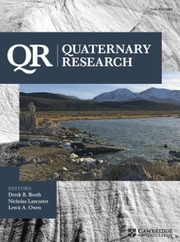Crossref Citations
This article has been cited by the following publications. This list is generated based on data provided by
Crossref.
Hostetler, Steven W.
and
Clark, Peter U.
2000.
Tropical Climate at the Last Glacial Maximum Inferred from Glacier Mass-Balance Modeling.
Science,
Vol. 290,
Issue. 5497,
p.
1747.
Burney, David A.
James, Helen F.
Burney, Lida Pigott
Olson, Storrs L.
Kikuchi, William
Wagner, Warren L.
Burney, Mara
McCloskey, Deirdre
Kikuchi, Delores
Grady, Frederick V.
Gage, Reginald
and
Nishek, Robert
2001.
FOSSIL EVIDENCE FOR A DIVERSE BIOTA FROM KAUA‘I AND ITS TRANSFORMATION SINCE HUMAN ARRIVAL.
Ecological Monographs,
Vol. 71,
Issue. 4,
p.
615.
Benning, Tracy L.
LaPointe, Dennis
Atkinson, Carter T.
and
Vitousek, Peter M.
2002.
Interactions of climate change with biological invasions and land use in the Hawaiian Islands: Modeling the fate of endemic birds using a geographic information system.
Proceedings of the National Academy of Sciences,
Vol. 99,
Issue. 22,
p.
14246.
Chadwick, Oliver A
Gavenda, Robert T
Kelly, Eugene F
Ziegler, Karen
Olson, Carolyn G
Elliott, W.Crawford
and
Hendricks, David M
2003.
The impact of climate on the biogeochemical functioning of volcanic soils.
Chemical Geology,
Vol. 202,
Issue. 3-4,
p.
195.
Hotchkiss, Sara
2003.
The Quaternary Period in the United States.
Vol. 1,
Issue. ,
p.
441.
Stock, Jonathan
Coil, James
and
Kirch, Patrick V.
2003.
Paleohydrology of arid southeastern Maui, Hawaiian Islands, and its implications for prehistoric human settlement.
Quaternary Research,
Vol. 59,
Issue. 1,
p.
12.
Price, Jonathan P.
2004.
Floristic biogeography of the Hawaiian Islands: influences of area, environment and paleogeography.
Journal of Biogeography,
Vol. 31,
Issue. 3,
p.
487.
Clement, Wendy L.
Tebbitt, Mark C.
Forrest, Laura L.
Blair, Jaime E.
Brouillet, Luc
Eriksson, Torsten
and
Swensen, Susan M.
2004.
Phylogenetic position and biogeography of Hillebrandia sandwicensis (Begoniaceae): a rare Hawaiian relict.
American Journal of Botany,
Vol. 91,
Issue. 6,
p.
905.
Lohse, Kathleen A.
and
Matson, Pamela
2005.
CONSEQUENCES OF NITROGEN ADDITIONS FOR SOIL LOSSES FROM WET TROPICAL FORESTS.
Ecological Applications,
Vol. 15,
Issue. 5,
p.
1629.
Williams, A.J.
Stuart, F.M.
Day, S.J.
and
Phillips, W.M.
2005.
Using pyroxene microphenocrysts to determine cosmogenic 3He concentrations in old volcanic rocks: an example of landscape development in central Gran Canaria.
Quaternary Science Reviews,
Vol. 24,
Issue. 1-2,
p.
211.
Lohse, Kathleen A.
and
Dietrich, William E.
2005.
Contrasting effects of soil development on hydrological properties and flow paths.
Water Resources Research,
Vol. 41,
Issue. 12,
2005.
Allgemeine Geobotanik.
p.
269.
JAMES, HELEN F.
and
OLSON, STORRS L.
2005.
The diversity and biogeography of koa-finches (Drepanidini: Rhodacanthis), with descriptions of two new species.
Zoological Journal of the Linnean Society,
Vol. 144,
Issue. 4,
p.
527.
Bonacum, James
O’Grady, Patrick M.
Kambysellis, Michael
and
DeSalle, Rob
2005.
Phylogeny and age of diversification of the planitibia species group of the Hawaiian Drosophila.
Molecular Phylogenetics and Evolution,
Vol. 37,
Issue. 1,
p.
73.
Frenzel, Burkhard
2006.
Progress in Botany.
Vol. 67,
Issue. ,
p.
460.
Chadwick, Oliver A.
Kelly, Eugene F.
Hotchkiss, Sara C.
and
Vitousek, Peter M.
2007.
Precontact vegetation and soil nutrient status in the shadow of Kohala Volcano, Hawaii.
Geomorphology,
Vol. 89,
Issue. 1-2,
p.
70.
Martin, Patrick H.
Sherman, Ruth E.
and
Fahey, Timothy J.
2007.
Tropical montane forest ecotones: climate gradients, natural disturbance, and vegetation zonation in the Cordillera Central, Dominican Republic.
Journal of Biogeography,
Vol. 34,
Issue. 10,
p.
1792.
Blard, P.-H.
Lavé, J.
Pik, R.
Wagnon, P.
and
Bourlès, D.
2007.
Persistence of full glacial conditions in the central Pacific until 15,000 years ago.
Nature,
Vol. 449,
Issue. 7162,
p.
591.
Pigati, Jeffrey S.
Zreda, Marek
Zweck, Chris
Almasi, Peter F.
Elmore, David
and
Sharp, Warren D.
2008.
Ages and inferred causes of Late Pleistocene glaciations on Mauna Kea, Hawai'i.
Journal of Quaternary Science,
Vol. 23,
Issue. 6-7,
p.
683.
James, Helen F.
and
Price, Jonathan P.
2008.
Integration of palaeontological, historical, and geographical data on the extinction of koa‐finches.
Diversity and Distributions,
Vol. 14,
Issue. 3,
p.
441.


